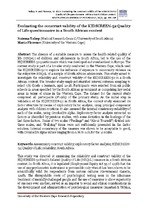| dc.contributor.author | Taliep, Naiema | |
| dc.contributor.author | Florence, Maria | |
| dc.date.accessioned | 2012-08-14T14:20:00Z | |
| dc.date.available | 2012-08-14T14:20:00Z | |
| dc.date.issued | 2012 | |
| dc.identifier.citation | Taliep, N. and Florence, M. 2012. Evaluating the construct validity of the Kidscreen-52 Quality of Life questionnaire within a South African context. South African Journal of Psychology, 42(2): pp. 255-269 | en_US |
| dc.identifier.issn | 0081-2463 | |
| dc.identifier.uri | http://hdl.handle.net/10566/402 | |
| dc.description.abstract | The absence of a suitable measure to assess the health-related quality of life (HRQoL) of children and adolescents in South Africa, led to the use of the KIDSCREEN-52 questionnaire which was developed and standardised in Europe. The current study is part of a broader study conducted in the Western Cape, which used the KIDSCREEN-52 to explore the influence of exposure to community violence on the subjective HRQoL of a sample of South African adolescents. This study aimed to investigate the reliability and construct validity of the KIDSCREEN-52 in a South African context. The broader study employed stratified interval criterion sampling to select 565 Grade 9 learners, aged 14-18. Participants were selected from six public schools in areas specified by the South African government as comprising key nodal areas in terms of crime in the Western Cape. The dataset for the current study comprised all participants (N=565) of the primary study. As the initial step in validation of the KIDSCREEN-52 in South Africa, the current study examined its factor structure by means of exploratory factor analysis, using principal component analysis with oblimin rotations. It also assessed the internal consistency reliability of each of the scales, using Cronbach’s alpha. Exploratory factor analysis extracted 10 factors as identified by previous studies, with some deviation in the loadings of the last three factors. Items of two scales (“Feelings” and “About Yourself”) divided into three scales, and “Bullying” items were not sufficiently presented in the factor solution. Internal consistency of the measure was shown to be acceptable to good, with Cronbach’s alpha values ranging from 0.76 to 0.81 for the 10 scales. | en_US |
| dc.language.iso | en | en_US |
| dc.publisher | Psychological Society of South Africa | en_US |
| dc.rights | This is the author postprint version of an article published by Psychological Society of South Africa. The file may be freely used, provided that acknowledgement of the source is given | |
| dc.subject | Assessment | en_US |
| dc.subject | Construct validity | en_US |
| dc.subject | Exploratory factor analysis | en_US |
| dc.subject | Kidscreen-52 | en_US |
| dc.subject | Quality of life | en_US |
| dc.subject | Reliability | en_US |
| dc.subject | South Africa | en_US |
| dc.title | Evaluating the construct validity of the KIDSCREEN-52 Quality of Life questionnaire in a South African context | en_US |
| dc.type | Article | en_US |
| dc.privacy.showsubmitter | true | |
| dc.status.ispeerreviewed | true | |

